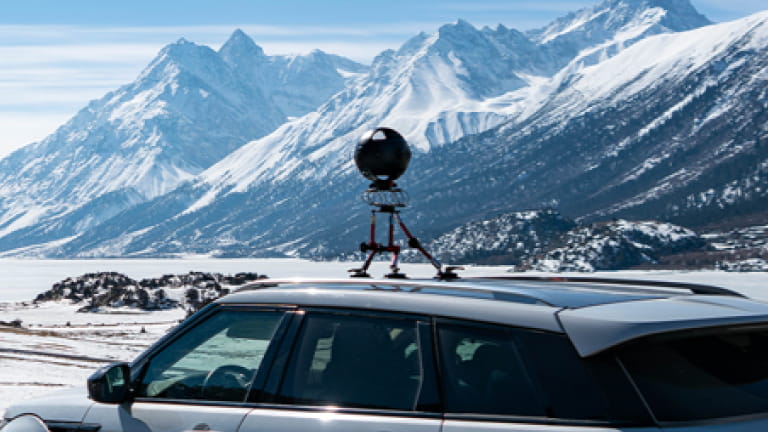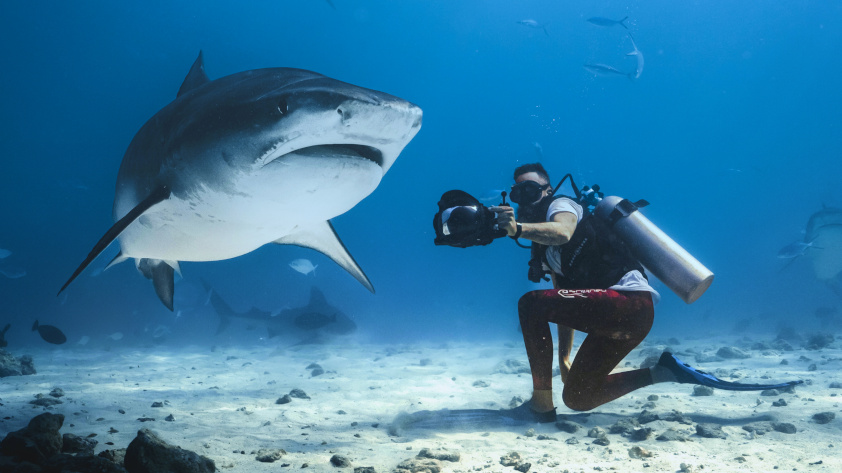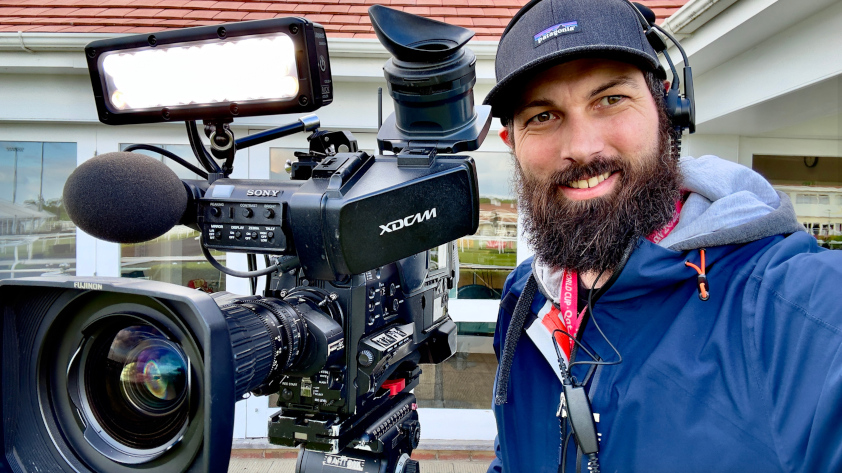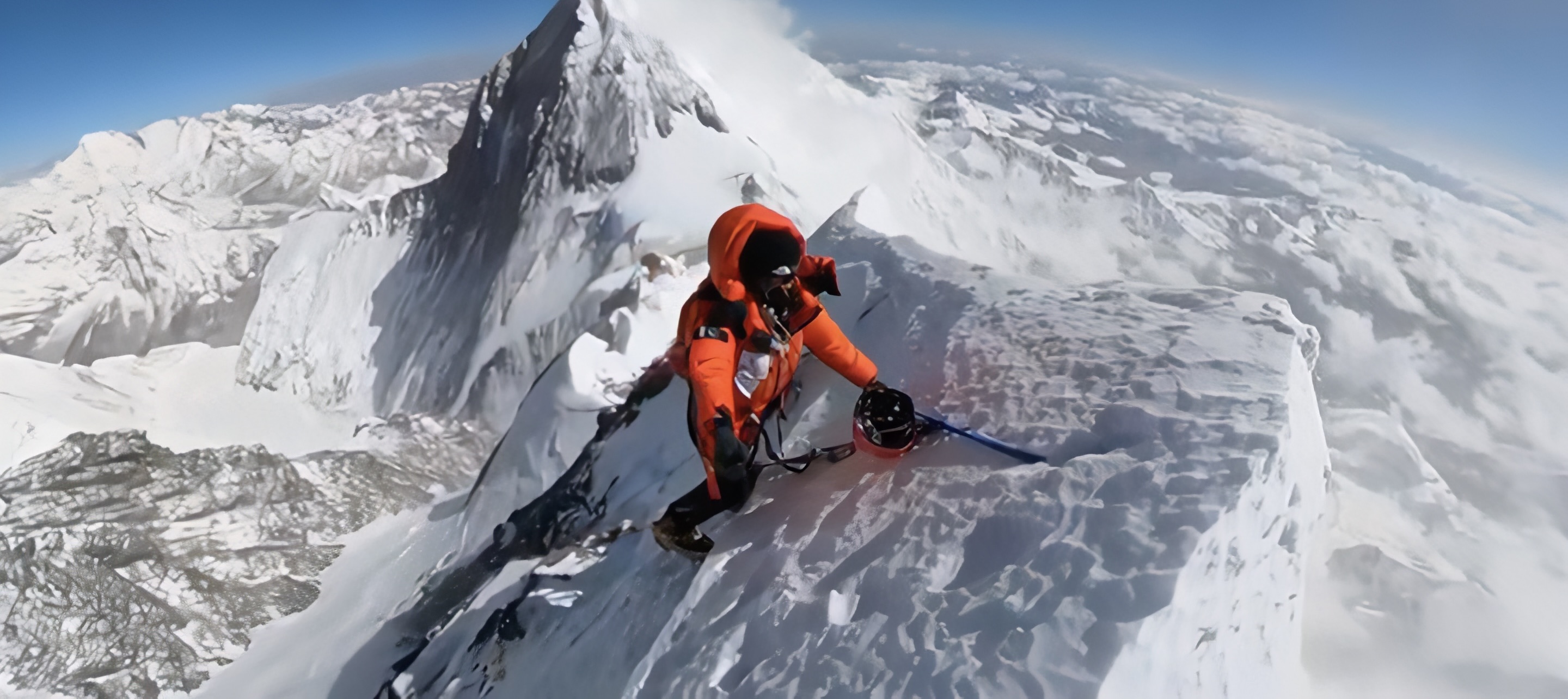For World Oceans Day 2024, Insta360 has once again partnered with the NGO Deep Sea Guardians. Founded by Insta360 creator Zimy (@zimydakid), Deep Sea Guardians raise awareness of ocean conservation and shark protection through filmmaking, science and education.
Equipped with certified shark-proof 360º action camera Insta360 X4 and the Invisible Dive Case, Deep Sea Guardians recently went diving with tiger sharks, capturing never-before-possible perspectives with the hope of changing attitudes toward these magnificent animals. To help raise money for this important cause, Insta360 donated US$1 for every comment on the video for 72 hours.
In total, an incredible US$5977 was raised which will fund new GPS satellite tags for endangered shark species to study their movements and migrations.
We sat down with the founder of Deep Sea Guardians, Zimy, to talk about this important mission, how they are working with Insta360, the devastating effects on our sharks and oceans if we don't change our attitudes soon and how we can help.
Hey Zimy! Please tell us more about yourself—who you are, where you're from and what you do.
Hi! My name is Zimy. I'm a Swiss filmmaker, director, DoP, photographer and conservationist. I was born and raised in Lausanne, Switzerland, where I currently still live, even though we spend most of our time abroad working on projects and productions. Besides producing films, we also run our own NGO called Deep Sea Guardians, with which we lead several projects to help protect the ocean, especially sharks.

What is Deep Sea Guardians' mission?
At first, the goal was only to create a feature-length documentary (we've been working on it for about four years now) and images to raise awareness about what's happening. However, the project quickly grew, and we started several different projects to help sharks through education and science as well.
We now have three major approaches to our shark conservation mission to have the most impact:
- Images: We raise awareness about what's happening, challenge people's misconceptions about these amazing predators and make people fall in love with these fascinating animals.
- Education: We have a school program called YAP (Youth Awareness Program), with which we visit schools and teach kids about sharks, why they're disappearing, why we need them and what can be done to help. We also regularly hold conferences to educate people and raise awareness about these topics.
- Science: We have worked on several scientific studies to understand sharks better and protect them through science.
Why is this mission important to you?
After several years working as a freelance filmmaker and cinematographer, I needed to find a way to create more meaningful things and use my skills and talent in filmmaking to have a positive impact on our world.
Since I was young, I've always been passionate about sharks. They've always represented THE apex predator, and they have always fascinated me. The more I started learning about them, the more I understood that they were disappearing at an alarming rate due to commercial and industrial fishing. In the last 50 years, we've lost more than 70% of shark populations globally, which is even more catastrophic when you know that sharks have been on our planet long before trees even existed. From there, I decided to start using my knowledge of creating images to help protect them.

How do Deep Sea Guardians raise awareness and change attitudes towards sharks?
Social media is one of the main and most powerful tools we're using. We constantly share images to inform people about what's happening to the world's oceans and that we are losing sharks at an alarming rate. We've run several social media campaigns, gathering millions of views. We also collaborate with brands like Insta360 that already have major platforms and communities to reach as many people as possible with our message and amplify the positive impact we can have on sharks by changing people's perceptions and making them aware of this issue.
Besides social media, we also regularly give conferences and school talks. We've also had the opportunity to speak on national TV and radio several times about these matters.
Last year, Insta360 and Deep Sea Guardians raised US$2100 for World Environment Day. Can you share how this impacted your mission?
Thanks to our collaboration with Insta360 and the money raised during last year's World Environment Day, we've partially funded GPS satellite tags that we successfully placed on Mako sharks in Baja California Sur, Mexico, earlier this year. This is part of a tagging project we're leading in collaboration with a local NGO and marine biologists. Once placed on the shark's dorsal fin, these GPS tags allow us to study its migration and movements, which is extremely valuable for their protection.
We're currently analyzing all the data gathered and will put together a scientific paper that will ultimately lead to better protection measures for the critically endangered Mako sharks.
For more information on the 2023 World Environment Day project, click here.

How important is Insta360 X4 for your mission, and how do you use it?
Insta360 X4 is an amazing camera that allows us to capture images and perspectives of these animals that were completely impossible to get just a few years back. From a scientific point of view, it allows us to analyze specific behaviors and better understand them. From a filmmaking point of view, it allows us to capture truly breathtaking images and footage that people have never seen, which hopefully will spark an interest in sharks in people's hearts. It is a very common human behavior to protect what you love, so if we can make people fall in love with sharks through amazing cinematography, then it's a huge win for us in our fight!
What are the biggest issues and obstacles you face when recording sharks? Is there anything X4 does to help overcome these issues?
The main challenge when filming sharks is being able to get amazing images without sacrificing safety. Sharks aren't monsters at all, but they aren't sea puppies, either. They are apex predators, and they must respected for what they are. We always have to be extremely careful to make sure both we, the divers and the sharks, can interact safely in the water. It takes years of experience, and it is obviously an extra dimension to think about when being in the water with sharks compared to other wildlife.
X4 and its ability to record in 360º is extremely handy because it allows us to reframe the shot in post-production. This means we can just leave the camera recording and 100% focus on the sharks and our interaction with them.
What is the importance of sharing these videos and pictures?
Because of modern media and films like Jaws, sharks are always portrayed as the bad guys. They're always these bloodthirsty, mindless killers, which has led to their extremely bad reputation in the public's opinion.
By sharing the images we do where sharks are portrayed in a true and positive way, we're trying to fight this misconception everyone has about them and show people that they aren't monsters but absolutely amazing and fascinating creatures that have evolved for millions of years to become the top predators that they are today!
We also show people that with the right experience, we can dive and interact safely with these animals, which is truly mind-blowing. They are so beautiful and so tolerant, allowing us to be with them in the water—they're truly fascinating.

Please share a bit about this collaboration with Insta360 for World Ocean Day. What is the reason for it?
For World Ocean Day 2024, we put together a little reel with Insta360 that I captured on the new Insta360 X4, giving an amazing insight into what it looks like inside the mouth of a tiger shark. Similarly to what we did in 2023, this collaboration will not only allow us to raise money to support our conservation efforts but also spark interest in these amazing animals.
What is the biggest threat to sharks?
The biggest threat to sharks is definitely the commercial fishing industry, which has caused a decrease of more than 70% of shark populations globally in the last 50 years. Almost all big shark species are threatened with extinction nowadays, and some of them are even critically endangered, such as great hammerhead sharks, with several scientists sounding the alarm that we could love entire species in the next 30 years. Once a species is extinct, it is gone forever, and it will never come back. This is the direct result of our impact through commercial fisheries.
Industrial fisheries target sharks mainly for their fins, which are the most valuable part and are mostly consumed in a dish called "shark fin soup." The meat is a lot less valuable, but it is also commercialized globally. But the problem doesn't stop there. Fisheries that don't necessarily target sharks also kill them through bycatch: they accidentally catch them because of the non-selective fishing method they use when targeting other species. For example, shrimp fisheries have a bycatch rate of 99%, meaning that for 100% of their catch, there's 1% shrimp, and the rest are animals caught accidentally, dying for no reason when they aren't even going to be commercialized. The only way to change the tide is not only for people to stop consuming seafood but also for governments to start taking real measures to stop this massive slaughter, which is going to lead to a complete collapse of the world's oceans.
Do you think it's hard to change someone's attitude towards sharks? If yes, why?
Yes, because people are always exposed to a negative image of sharks in the media. Whenever a Hollywood movie or a news article that involves sharks comes out, they are always portrayed as monsters. This is why we are using images to fight hard against this misconception: at the end of the day, no one wants to protect a monster! If people understand how beautiful, amazing and important sharks are for ecosystems, then they'll start caring about them.
What will happen if attitudes towards sharks don't change?
It will ultimately lead to their disappearance. If we don't immediately change our relationship with the ocean, we'll lose them, leading to a complete collapse.

What is the impact of disappearing shark populations?
Sharks are on top of the food chain. They keep the entire food chain in balance, and they also keep oceans healthy by eating weak and ill animals. If we remove sharks from the food chain, it'll be completely unbalanced and it'll fall apart. But then what? Well, if the ocean ecosystems fall apart, we humans disappear with them because the oceans are our planet's lungs. There are microalgae called phytoplankton blooming on the ocean's surface that work just like trees by creating oxygen. So basically, no sharks means no ocean, which means no oxygen, which means no more us…
When was the first time you went diving with sharks?
The very first shark I saw was a black-tip reef shark in Malaysia snorkeling with my dad when I was about ten years old. Our journey with sharks truly started about six years ago when we first dove with tiger sharks in French Polynesia. The day I saw these massive tiger sharks, I felt something simply indescribable, and that was when I decided, "OK, this is what I want to do."
Do you ever get scared or feel nervous around sharks?
In the beginning, yes, because you're in front of a massive apex predator and don't know much about them. But over the years, you gain experience, learn to read their behavior, and start feeling more comfortable because you understand them. Nowadays, I don't get much scared anymore. But, depending on the situation, things can heat up quickly and get serious. Depending on the species, the number of sharks, the water visibility or even the weather conditions, it can be more or less dangerous to dive with them. It is extremely important to know your limits and always keep things safe, because whenever an accident happens, it can not only be deadly for people but also be extremely negative for sharks. If there is an accident, they'll be portrayed as monsters without trying to understand what led to a specific accident.

What can we, as humans, do to help?
The easiest and most effective way is to simply stop eating seafood completely. Depending on the social and economic situation, it's not always possible, but I'd say that people who don't need fish or seafood for their survival can rely on other sources of food. It might sound extreme to some people, but the fact is that our ocean ecosystems are falling apart, marine wildlife is disappearing, and this is the direct result of people's greed: people with the privilege of eating seafood can easily do without it.
If anyone cares about sharks, the survival of our oceans, and, therefore, our survival, they should stop eating fish and seafood. It is very simple and powerful, allowing you to feel great by not being part of the problem but part of the solution.
Another great way to help protect sharks is to go diving with them! It might sound weird, but by going diving with sharks, you help promote an industry in which sharks are financially more valuable alive than dead. Indeed, shark diving creates a lot of jobs and brings a lot of money to the government, and, let's be honest, the most important thing for governments is money. Creating an industry in which sharks are financially worth more alive than dead creates a real interest for governments to protect them. Let's take The Bahamas, for example. Shark diving became so big there that it attracted people worldwide and brought so much money to the government that in 2011, the Bahamian government decided to completely protect the sharks in their waters, and the entire country is now a shark sanctuary.
We'd like to give a huge shoutout to Zimy for taking the time to chat with us about this important mission. Check out his incredible short documentary, "Shark Realm: The Endangered Queens of Bimini," made with Insta360 last year on his YouTube channel:
Interested in becoming a Deep Sea Guardian or supporting their mission? Share their work on social media or contact them at info@deepseaguardians.org.
Keen to keep up to date on Insta360 stories? Keep an eye on our blog and sign up for our mailing list.
































